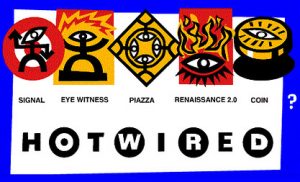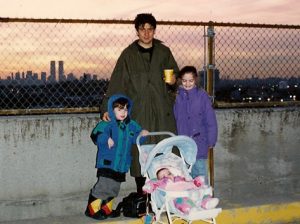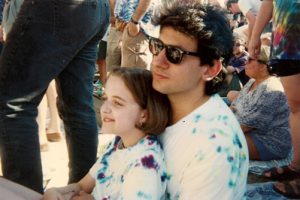
(This is chapter 14 of my ongoing memoir of the Internet industry.)
We had our book deal. Now all Christian Crumlish and I had to do was assemble a kick-ass anthology of great fiction and poetry from the web. Then we’d be all set. We just needed to find forty amazing pieces of fiction and poetry on the Internet.
In other words, we were in big trouble. We’d done such a convincing job of hyping up the creative potential of the online literary scene to our publisher Marjan Bace, to our friends and fellow writers, to each other — but we’d been talking about potential, and now we were supposed to come up with a groundbreaking literary anthology representing a cornucopia of online talent, a new scene bursting with originality and genius. Genius? The literary web was two years old.
Who exactly were the hot online writers of 1996? I emailed Carl Steadman of Suck.com, and Joseph Squier, whose 1994 “Life With Father” had been the first well-known web poem. I was very glad when both of them agreed to be in the book. Jason Snell and Greg Knauss from Intertext signed on for the ride. I asked Mia Lipner from Word for permission to use her story about blind (literally) dating, and asked Clay Shirky if he would represent Urban Desires with his clever “Notes on Sinking”.
Christian invited several of the best Enterzone writers. Martha Conway’s fiction was fresh, hip and witty. The Burroughsian David Alexander had enough talent, Christian and I both felt, to carry an entire book (unfortunately, we had agreed to run only one piece per author). Jamie Fristrom was a young Gen-X’er with an appealing and soft tragic voice. Other Enterzone contributors like Steve Seebol, Tabitha Rasa and Briggs Nisbet helped the book along.
We were on solid ground with all these good writers, but we had forty slots to fill. We also had many friends who wanted to be in a book, and this is where our fatal flaw kicked in. Christian and I, it turns out, are both “inclusive” personalities, great at saying yes, not so great at saying no. A good editorial team for a literary anthology would have one funnel and one filter, but Christian and I were two funnels.
“Sure,” we’d say to one writer friend after another. “Sure, you can be in the book.” We didn’t even have a process for vetoing each other’s choices. I didn’t like some of Christian’s pieces and I know he didn’t like some of mine, but they all went in. We didn’t want any negative vibes, after all.
We then made the terrible mistake of inviting several of the writers to help us decide which of their works to include in the book. This is something no literary anthologist should ever do. Our book called for short, fast-moving pieces, but we ended up with a lot of thick, grandiose masterworks. That’s what happens when you ask writers to select their own best pieces for an anthology — you get the dusty heavy stuff from the shelves.
Several of the pieces hadn’t even appeared on the Internet. We also had no concern for the appearance of nepotism. My wife Meg was a talented writer and so was Christian’s brother Peter, but it still might not have been the best idea to include long pieces by both. Christian and I also included our own long pieces in the book, and in retrospect I really wish we hadn’t indulged ourselves by doing this.
We further indulged ourselves by inviting three “rock star” writers who clearly did not belong in the book. Mike McCullough of the Sonic Youth fan site Evol.org put me in touch with Lee Ranaldo, who had published some Beat-inspired poetry online. Jason Gross of the long-running music site Perfect Sound Forever hooked us up with Mike Watt of the Minutemen, one of Christian’s favorite bands.
Christian then scored a big coup by getting an okay from Robert Hunter, the masterful lyricist of the Grateful Dead, who had posted some surprising personal writings on the Dead’s official website in the wake of Jerry Garcia’s death. I had tremendous admiration for Robert Hunter (who had been Jerry’s songwriting partner, while the more web-savvy John Perry Barlow had written songs with Bob Weir). I was quite surprised that this shy and reclusive figure had agreed to be in our book. It took a while before I got over being impressed and realized what a big mistake we made by including him.
This anthology needed to feel fresh, snappy, fast, current. We were supposed to be celebrating a new wave of unknown writers, so what was the lyricist for the Grateful Dead doing here? The fact that he co-wrote “Box of Rain”, “Tennessee Jed” and “Touch of Grey” was irrelevant; Robert Hunter was not a web writer. Neither was Lee Ranaldo or Mike Watt. It made our book phony. I truly regret not having the good judgment to understand this at the time.
We did find some hidden gems, though, as we scoured the Internet. Xander Mellish was a wistful New Yorker whose “single girl” dating tales were like Candace Bushnell without the shoes. Steve Silberman contributed a wonderful piece about coming to terms with his large body type. E. Stephen Mack, Gael Morlan, Annette Loudon, Scot Hacker and Janan Platt were engaging writers from our antiweb mailing list. Alison Dorfman was a clever scenester who worked at Sonic.net. I exchanged emails with a fascinating poet named Gregory Severance who, it turned out, was also a Time Inc. employee and worked across the street.
Carl Steadman suggested I check out a web writer named Walter Miller. A Yahoo search on this name turned up one of the strangest and funniest web pages I had ever seen. Walter Miller was a 20-year-old living a horrifying life with his evil and disgusting grandfather in East Texas while working as a data entry clerk at Prodigy. His desperately unhappy and badly misspelled diary entries were amazing to read:
My granfather has a sick sence of humour. The other day he waited til I was in the exact worst spot and the gristtly old basterd forced out a giant fart. It was so loud it set off the lamp in the other room which was attached to the clapper.
My granfather insists Court TV is on all day long. He clentches a cigarete in his teeth while yelling at the top of his lungs at the TV. Its the most frightning noise you ever want to hear. Lately he saw on the news that dirty pitcures are on the World Wideweb. Each day he makes me find him new ones to lear at. He yells and screams at me when they tak too long to load on the screen Then he hits me with a cupped hand right on my ear, he knows it hurts. The other day he hit me so many times the ear was bleading. I complained and he called me allot of nasty names and then he put a cigarete out on the back of my head.
Yes Im in an abbusive relatonship. Hes in a whelchair but Im still scared of him. I know it sounds dumb. Some of his threats are to rip my lungs out throuhg my anes, then tie them around my head like Micky Mouse ears. I know he wont carry thru his threats but Im afraid anyway. Im not ashammed to say somtimes I cry. But this isnt a cry for help. Only I can rescue myself. Ive been in therapy in the past-I have a poorselfimage problem too. I geuss I have to be a man and start standin upfor myself.
I couldn’t tell if this was a real person or not, but I knew that a piece that made me laugh so much belonged in our book, and I emailed Walter Miller and got a hilariously misspelled okay. Just a few days later, I was very surprised to read an article about the Walter Miller phenomenon on Pathfinder’s own internet culture site Netly News. This was written by Josh Quittner, who’d done some investigative reporting and revealed — no big surprise — that this character was actually the invention of a comedy writer.
That very day I got a email from the real life writer who’d created the Walter Miller page. We became friends — he lived in New York City and was about my age — and met a few times for lunch. To this day, I believe Josh Quittner and I are the only two people who ever knowingly met the “real” Walter Miller. The most shocking thing he told me was that his own wife did not know that he was moonlighting as Walter Miller. “She doesn’t have that kind of sense of humor, she wouldn’t like it,” he said.

The Walter Miller humor piece was one of the last selections for the book. Once Christian and I had assembled all our fiction and poetry we began trying to turn the highly disparate offerings into a unified whole. This did not go well. Editing a book via email sounds great until you try to do it. We ended up with twenty or thirty unfinished conversations lingering between us, and could never find a rhythm that worked. I eventually got Christian angry by insisting that we keep only a single email going back and forth, since all the threads were making me insane.
We also couldn’t think of a title for the book. Our contract specificied that we’d call the book Voices of the Web if we didn’t come up with something better, and since Christian and I both hated that name we knew we had to had to come up with something better. It probably reveals a lot about the state of our collaboration that the top title on our shortlist was Disconnect.
We didn’t actually argue or disconnect much, though — we probably should have argued a lot more. I flew out to California at one point, but once again we had too many enjoyable plans distracting us from our work. We drove out to Los Gatos, near San Jose, to spend a wonderful evening with John Cassady, the affable son of Beat Generation legend Neal Cassady, and his girlfriend Pat Gallagher. We hung around, ate Mexican food, played guitar (John was quite talented), drank, talked. The only thing we didn’t do on this visit was get a lot of work done on the book.

As we plugged away on the book, an exciting new distraction appeared. Dan Levy had been talking to me for a while about building a website for Bob Dylan. He’d made a proposal to the Dylan management team and felt sure we’d get the job once the time was right. Now Bob Dylan was getting ready to release his first album of original songs in many years, Time Out of Mind, and the organization was ready to hire Dan and me. They had already obtained the BobDylan.com domain name and were ready to go — was I on board?
I was too busy to do it, but I couldn’t say no. I’m not into hero worship, but if I ever were to worship a hero it would probably be Bob Dylan. I respect everything about him: his lyrics, his knowledge, his spiritual philosophy, his sense of humor, his artistic integrity, his existential vision, his endless identity games. I also think people are crazy to say he has a bad singing voice; he has one of the best singing voices of all time.
There was also a “full circle” appeal to the idea of being hired by the Dylan organization. The first online community I ever became a part of was rec.music.dylan, my first substantial online writing effort was a long essay on Dylan’s movie Renaldo & Clara, and I’d designed the cover of my Queensboro Ballads writing project to look like a Dylan album. It seemed like a big honor to accept this job (even though I had no expectation that Bob Dylan himself would become involved, or care about the site we built).
Naturally, I told Dan I’d take the job, on an hourly/moonlighting basis. Now I had a demanding position at Time Warner, a book to edit, a literary website to run and Bob Dylan’s website to build. I had no idea how I was going to juggle it all.








11 Responses
I agree that Dylan’s voice is
I agree that Dylan’s voice is one of the best of all time. I’ve noticed that people who say he can’t sing always seem to sing themselves in the most technically correct but completely inexpressive way. In fact, I think his voice is responsible for quite a bit of the poetry we hear in Dylan. No one’s voice can do what his can. And it’s changes over the years. My god! It’s an absolutely fascinating evolution.
People like Simon Cowell
People like Simon Cowell think canaries are artists
…like Candace Bushnell
…like Candace Bushnell without the shoes.
That’s one of the pithiest but most apropos descriptions of Xander’s stuff. Plus, it manages to get a smack in on that primadonna hack Bushnell. Nice. Very nice.
I’ve still got my copy of Coffeehouse. You & Christian were kind enough to send me a contributors copy, even though I was cut from the final product.
It’s a piece of web history, back when we thought we could still catch these lightning bugs in jars and hold them still for the world to admire. I keep it with the first Mozilla t-shirt, a Be Inc stock certificate, an AOL floppy, and Scot Hacker’s BeOS Bible – all of them stored in an acid-free plastic storage container known as The Reliquary.
Gate, gate, para gate, parasamgate…
The other interesting thing
The other interesting thing about Walter Miller: He was the national Jeopardy TV show champion around the time he was doing all this. Though I had interviewed him for TIME, he never gave me his real name. I learned it later, when, coincidentally, I saw him on Jeopardy.
Good to hear from you,
Good to hear from you, Josh!
I hope you’ll come back in a couple of weeks — I have at least one other Netly News story to tell …
I bought a used copy of
I bought a used copy of Coffeehouse: Writings From the Web that I found on Amazon a few years ago. It’s a great book.
Bob Dylan, Elvis and Ray
Bob Dylan, Elvis and Ray Charles could sing a telephone directory and it would still sound unique, poetic and beautiful.
That excerpt from Walter
That excerpt from Walter Miller reminded me of when my brother used to say stuff like he was going to rip my arms off, shove ’em in my ears and ride me like a motorbike.
My copy of Coffeehouse did
My copy of Coffeehouse did some time in the King County Library System. It still has the call number laminated onto the lower part of the spine, and a stamp on the first page that verifies the book’s legitimate release. More than one state has a Kent county and I’m not sure which one this is. I don’t remember where the book was shipped from.
The cool thing is that the book was in the library. The bad part is that it was removed. But the other good thing is, now I have it.
It’s King County, not Kent
It’s King County, not Kent County. But there is also a small label laminated to the cover that says “Kent.”
Not to be bragging or
Not to be bragging or anything
but my online karoke of ‘just like a women’ is nearly indistinguishable from from his
I always thought ‘lay lady lay’ was his most melodic vocalization